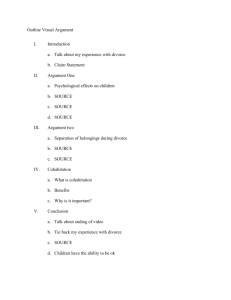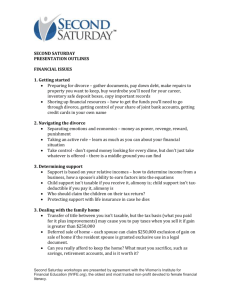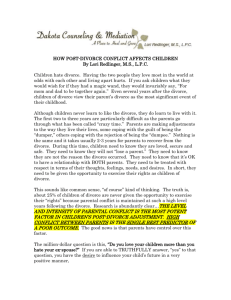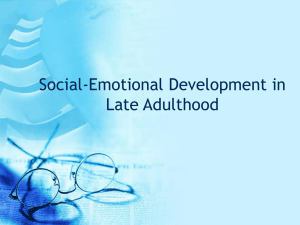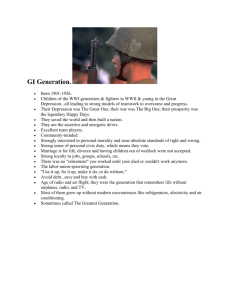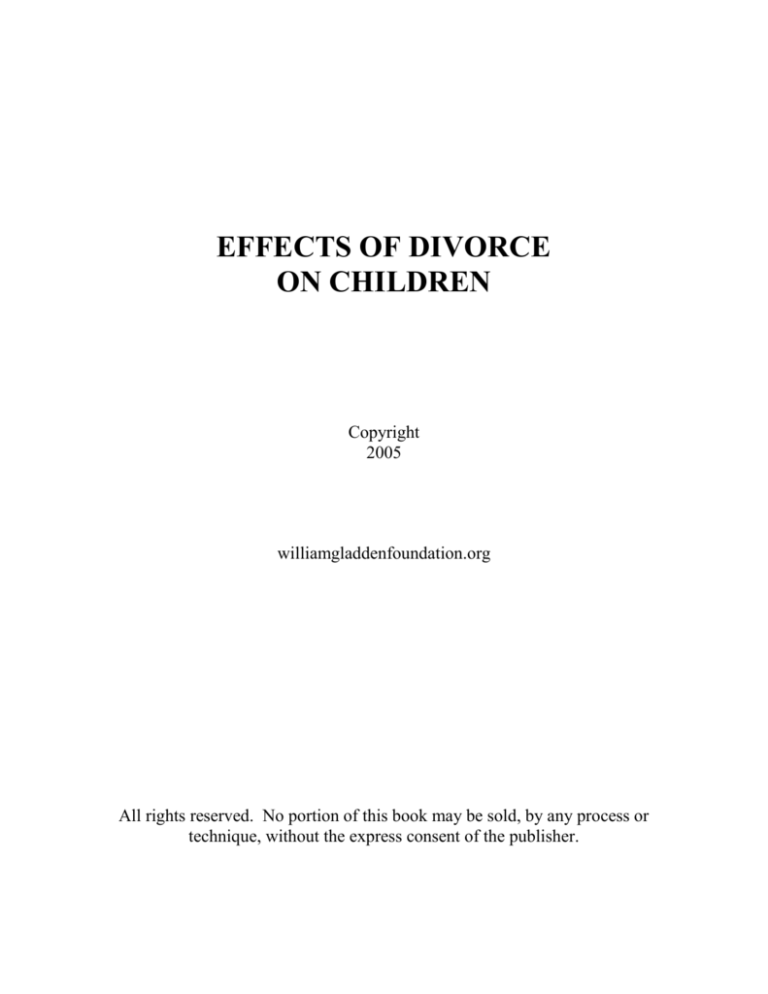
EFFECTS OF DIVORCE
ON CHILDREN
Copyright
2005
williamgladdenfoundation.org
All rights reserved. No portion of this book may be sold, by any process or
technique, without the express consent of the publisher.
INTRODUCTION
The divorce rate in the United States rose steadily throughout the twentieth century.
Prior to 1915, less than 10% of husbands and wives divorced. Between 1915 and 1940,
the divorce climbed to almost 15%. By 1965, the divorce rate eclipsed 25%. In 1985,
about 35% of all marriages ended in divorce. In the year 2000, half of all marriages
ended in divorce. In 2004, almost 60% of marriages with children ended in divorce, and
the rate for second marriages with children was even higher. With such a high divorce
rate, is it any wonder that so many American children experience adjustment problems?
Divorced couples point to various reasons for their marital breakup: money, sex,
incompatibility, immaturity, lack of commitment, violence, unhappiness, jealousy, stress,
infidelity – to name a few. These marital problems are not new, however; they affected
relationships a century ago.
Many experts believe the high divorce rate is a result of dramatic social and economic
changes that have altered traditional family roles and relationships. They cite how
increased industrialization, urban living and many other social forces have affected the
makeup and lifestyle of the American family. Families are less likely to work, participate
in activities or eat meals together. Husbands and wives may both work outside the home.
As a result, many American children must develop self-dependence at an early age than
their ancestors did.
America’s children reflect the effects of what is happening to the American family.
Never before have so many children faced so many problems: physical and sexual abuse,
crime and delinquency, depression and suicide, drug and alcohol abuse, emotional and
behavioral problems, learning difficulties, school problems, dropping out, poor grades,
running away from home, pregnancy, abortion and venereal disease. Sometimes these
problems result from unhealthy social or family relationships. They also may arise as a
byproduct of an unhappy marriage or a damaging divorce.
-II-
Divorce can be a very painful and disruptive experience for children, with long-term
effects. Some children manage to survive their parents’ unhappy marriage and painful
divorce and grow past it; other children suffer from the effects for years. How children
are affected by divorce largely depends on their personality, the circumstance
surrounding the divorce and the parents’ sensitivity to their children.
It is toward a better understanding of how parents can be more sensitive to their children
during the divorce process that this publication is dedicated. When parents put the needs
of their children first, and are aware of how their own behavior can either harm or help
their offspring during this time of turmoil, it is possible to reduce the negative EFFECTS
OF DIVORCE ON CHILDREN.
Waln K. Brown, Ph.D.
William Gladden Foundation
-III-
TABLE OF CONTENTS
QUESTIONS AND ANSWERS
Should Parents Stay Together For The Sake Of Their Children?........................................5
When Should Parents Tell Children About Separation Or Divorce?..................................5
Who Should Tell Children About Separation Or Divorce?.................................................5
How Should Parents Inform Children About Separation Or Divorce?................................5
What Should Parents Tell Children About Separation Or Divorce?...................................6
Will Children Be Angry When Told About Separation Or Divorce?..................................6
Can Divorce Cause Children To Develop Emotional Problems?........................................6
Are Children From Divorced Families At Risk To Have School Problems?......................6
Are Children Of Divorce At Risk To Be Delinquent?........................................................7
Are Age And Sex Factors In Determining How Divorce Affects Children?......................7
How Do Children’s Roles Change In A Single-Parent Home?...........................................7
How Do Parents’ Behaviors And Attitudes About Divorce Affect Children?....................7
What Is Divorce Mediation?...............................................................................................8
What Is Divorce Counseling?..............................................................................................8
Should Parents Experiencing Divorce Get Counseling?.....................................................8
Who Should Have Custody Of The Children?....................................................................8
How Can The Custodial Parent Help The Children?..........................................................9
How Can The Absent Parent Help The Children?..............................................................9
How Do Children Successfully Adjust To Divorce?..........................................................9
What Problems Do Children Face, When A Parent Remarries?.........................................9
COMMON REACTIONS TO DIVORCE …………………………………..………10
EFFECTS OF DIVORCE ON CHILDREN……..…….…………………………….12
WAYS TO HELP CHILDREN COPE SUCCESSFULLY WITH DIVORCE……13
ADJUSTMENTS FOR CHILDREN WHO EXPERIENCE DIVORCE..................14
ADJUSTMENTS FOR PARENTS WHO EXPERIENCE DIVORCE..……………15
AGENCIES TO CONTACT FOR HELP WITH DIVORCE.....................................16
-IV-
SHOULD PARENTS STAY TOGETHER FOR THE SAKE OF THEIR
CHILDREN?
Parents should ALWAYS consider their children when making decisions that affect the
family. This is especially true when they face a situation as serious and complicated as
divorce. Studies suggest that the effects of divorce on children depend greatly on how
well the parents handle their divorce. Children are usually better off living in a stable
single parent home than in a two parent home where the parents’ relationship is
unhealthy.
WHEN SHOULD PARENTS TELL CHILDREN ABOUT SEPARATION OR
DIVORCE?
The best time to tell children about separation or divorce is immediately AFTER making
a firm decision. Children should receive advance notice BEFORE the actual break-up
takes place. Experts suggest allowing a few weeks for the children to adjust to the
divorce, in order to help them work through the change with the parent from whom they
will be separated.
WHO SHOULD TELL THE CHILDREN ABOUT SEPARATION OR DIVORCE?
Both parents should be present to tell the children. In this way, children can ask
questions of both parents and gain a better understanding of the situation. When only one
parent is present, it is important for him or her not to speak for the absent parent. DO
NOT blame or make excuses for the absent parent.
HOW SHOULD PARENTS INFORM CHILDREN ABOUT SEPARATION OR
DIVORCE?
It is usually best for both parents and all of the children to discuss the situation as a
family. However, children of different ages may require separate explanations. Parents
should explain the situation carefully and encourage children to ask questions. They also
should answer questions honestly and to the best of their ability, while being careful not
to blame or argue, as this could create difficulties for the children. An honest, sensitive,
direct approach is usually best.
-5-
WHAT SHOULD PARENTS TELL CHILDREN ABOUT SEPARATION OR
DIVORCE?
Children are stronger and more adaptable than adults realize. They need truthful
information to understand and successfully adjust to separation or divorce. It is generally
best that parents thoroughly explain the reasons for their separation or divorce in terms
children can understand. It is also important that parents remember that children are very
sensitive. Studies show that lying to children, or keeping information from them that
may improve their understanding of the situation, can hamper their successful adjustment
and cause emotional problems.
WILL CHILDREN BE ANGRY WHEN TOLD ABOUT SEPARATION OR
DIVORCE?
YES, they usually are, although they may not immediately show their anger. Sometimes
children need to think about what they learned before they can respond. Frustration,
anger, pain and other confused feelings are NATURAL emotional responses expressed
by children when they learn about their parents’ separation or divorce. It is
UNNATURAL for children not to express their feelings. Children who block their
feelings may develop emotional or behavioral problems. If feelings are suppressed or
inappropriately expressed, counseling may help children express their feelings in healthy
ways.
CAN DIVORCE CAUSE CHILDREN TO DEVELOP EMOTIONAL
PROBLEMS?
Experts disagree on the answer to this question. It is difficult to know whether divorce
causes a child’s emotional problems, or if the child is suffering from the long-term effects
of a bad marriage. Recent studies suggest that marital conflict has a negative affect on a
child’s adjustment. Much of how a child adjusts depends on the parents’ sensitivity and
understanding of the child’s emotional needs during the divorce process.
ARE CHILDREN FROM DIVORCED FAMILIES AT RISK TO HAVE SCHOOL
PROBLEMS?
YES. Studies show that children from single parent families may not perform as well in
school as children from two parent families do. Some studies show that children from
single parent homes have higher rates of absenteeism, truancy, discipline problems,
suspensions, expulsions and dropouts. They also tend to have more reading difficulties.
This does not mean, however, that all children from divorced families have school
problems. Much depends on the damage caused by the divorce and the coping abilities of
the custodial parent and the child. Most children from divorced families do as well in
school as children from intact families.
-6-
ARE CHILDREN OF DIVORCE AT RISK TO BE DELINQUENT?
YES. Experts have studied single parent homes to learn if delinquency and other
behavioral disorders are more common in single parent homes. They found that a high
percentage of delinquents and behaviorally disordered children came from homes
disrupted by separation or divorce. They also discovered that MOST children from
single parent homes are NOT delinquent and do NOT have behavioral disorders.
ARE AGE AND SEX FACTORS IN DETERMINING HOW DIVORCE AFFECTS
CHILDREN?
YES. Children’s reactions to divorce may differ according to their age and gender.
Preschool children tend to blame themselves for their parents’ divorce. Children between
the ages of seven and 12 are more likely to feel rejected or abandoned by the departing
parent. Teenagers often worry that as adults they, too, will have difficulty maintaining
relationships. Social scientist once believed that sons suffered most from their parents’
divorce; however, recent studies indicate that daughters may suffer longer lasting
emotional harm.
HOW DO CHILDREN’S ROLES CHANGE IN A SINGLE PARENT HOME?
Children who live in a single parent home must accept more responsibility for taking care
of themselves. They sometimes offer more help with household chores. Older children
may act as junior parents to younger siblings. They may help make adult decisions or try
to fill the absent parent’s shoes. It is important for parents to remember that children
have their own age-specific needs and responsibilities. It is the parents’ duty to see that
each child’s behavior is appropriate with his or her age and current stage of development.
HOW DO PARENTS’ BEHAVIORS AND ATTITUDES ABOUT DIVORCE
AFFECT CHILDREN?
How parents handle divorce may be the most important factor in determining how
children are affected. Parents are role models who need to set a good example. Children
observe and imitate the behaviors and attitudes of their parents. When parents handle
divorce in a mature and healthy way, their children have a strong chance of making a
positive adjustment to divorce.
-7-
WHAT IS DIVORCE MEDIATION?
Divorce mediation and “conciliation counseling” are synonymous. An impartial person,
usually a trained mediator or counselor, helps the parents determine the conditions of
their divorce. Many issues involved in the divorce process can be decided through
mediation, such as division or marital assets, custody of the children and visitation rights.
Divorce mediation can reduce or eliminate attorneys’ fees, court costs and drawn-out
legal battles that can use up family assets and create bitterness that can harm children.
WHAT IS DIVORCE COUNSELING?
A main purpose of divorce counseling is to dissolve the marriage through cooperation. A
trained divorce counselor can help divorcing parents better understand their personal and
marital conflicts. The goal is not to fix blame; rather, it is to help the parents understand
the importance of future communications., Divorce counseling also can provide valuable
insights and approaches to develop and maintain healthy parent/child relationships.
SHOULD CHILDREN EXPERIENCING DIVORCE GET COUNSELING?
Not all children who experience divorce need counseling. However, it is often difficult to
be certain how divorce is affecting each child. Divorce can create stresses and problems
in children that are not always immediately visible. It is usually in the best interest of
children to get a professional opinion about how they are handling the divorce. If the
parents are participating in divorce counseling, the therapist may also wish to involve the
children. Counseling can help children who are coping well with divorce make an even
better adjustment.
WHO SHOULD HAVE CUSTODY OF THE CHILDREN?
Deciding who should have custody of the children is one of the most difficult and
potentially harmful issues in divorce. A parental tug-of-war can make victims of
children. Sometimes parents focus on their own selfish interests rather than on what is
best for their children. This approach to custody usually damages children. Parents
should ALWAYS base custody on a rational decision that meets the needs and best
interests of the children.
-8-
HOW CAN THE CUSTODIAL PARENT HELP THE CHILDREN?
Although divorce is very disruptive, children should continue performing their regular
activities. Children who maintain a normal routine tend not to be overwhelmed by
experiencing too many changes at once. Custodial parents also should be careful not to
expect a particular child to assume the role of the absent parent. This can cause
difficulties for everybody, especially the child. DO NOT tamper with the children’s love
or loyalty to the absent parent, for this may result in emotional or psychological
difficulties. Custodial parents should do their best to build and maintain a smooth and
healthy environment that allows the children to adjust to divorce at their own rates.
HOW CAN THE ABSENT PARENT HELP THE CHILDREN?
It is important that absent parents stay in regular contact with the children. Frequent
visits allow the children to maintain their relationship with the absent parent during a
time when that relationship may be especially important. Letters and telephone calls are
also ways for absent parents to express their love for the children. Absent parents should
be careful not to play “weekend Santa” in an attempt to buy affection. They should not
tamper with the children’s love or loyalty to the custodial parent, use the children as
messengers or question them about the custodial parent. Absent parents should do their
best to build and maintain a relationship that allows the children to adjust to the divorce
at their own rates.
HOW DO CHILDREN SUCCESSFULLY ADJUST TO DIVORCE?
The process of making a successful adjustment to divorce usually takes time. The
amount of time depends on many factors and varies. Successful adjustment to divorce
means coming to terms with change. Children must learn to do the following: 1) separate
themselves from parental conflict; 2) face the reality of their parents’ divorce; 3) let go of
reconciliation fantasies; 4) get over the sense of loss; 5) resolve their anger and tendency
to blame; and 6) build realistic hopes for the future.
WHAT PROBLEMS DO CHILDREN FACE, WHEN A PARENT REMARRIES?
Remarriage can be difficult for children. They often feel confused about their sense of
loyalty to the biological family and rebel again the stepparent. This is especially true of
children who have not adjusted to divorce and have not let go of reconciliation fantasies.
Children can feel emotionally “stretched” when trying to build a new relationship with a
stepparent, while remaining loyal to the biological parent. However, studies suggest that
remarriage can enhance the lives of some children, especially young children.
-9-
COMMON REACTIONS TO DIVORCE
The following chart lists some of the common reactions children have to divorce.
Children often have different reactions at different ages; however, not all children of the
same age will react in the same way. This chart is presented in broad terms. Much
depends on the child’s emotional maturity and other personal factors, as well as the
circumstances surrounding the divorce. The effects of these reactions will vary from
child to child.
AGE GROUP
COMMON REACTIONS
EARLY CHILDHOOD
(0 – 6 years)
- Confusion
- Fear of abandonment
- Crying
- Clinging
- Self-blame
LATE CHILDHOOD
(7 – 12 years)
- Worry
- Anger
- Sense of loss
- Feeling rejected
- Divided loyalties
EARLY ADOLESCENCE
(13-15 years)
- Confusion
- Moodiness
- Insecurity
- Feeling rejected
- Shame
- Anger
- Withdrawal
LATE ADOLESCENCE
(16 – 18 years)
- Anger
- Embarrassment
- Resentment
- Fear of intimacy
-10-
EARLY CHILDHOOD – Preschool children have a limited number of experiences.
Their small world centers on their parents and the family. They interpret what is
happening at a very sensitive, highly emotional level. An intellectual understanding of
divorce is beyond them. Divorce can be very confusing to preschool children, who tend
to fear abandonment and express their fear by crying or clinging to parents. They also
blame themselves for their parents’ divorce.
LATE CHILDHOOD – Elementary school-age children have begun to expand their
world beyond the family. They have entered a stage of growth where they are learning to
think about and question their experiences. Child of this age tend to worry about what
others think, and to worry about life in general. Their emotional responses to divorce can
range from very deep anger, to an acute sense of loss, to feeling rejected. Divided
loyalties are common among children of this age.
EARLY ADOLESCENCE – The early teens is a particularly delicate stage of growth.
Children of this age experience rapid physical, emotional and social changes. They are
often confused, insecure and prone to wide mood swings. Divorce is an added stress that
may cause children to feel rejected, ashamed of or angry with their parents or to withdraw
from family and friends.
LATE ADOLESCENCE – High school-age children have usually reached a level of
maturity that helps them cope with divorce. Children of this age may feel embarrassed
by their parents’ divorce. Fear of intimacy can become an issue to children of this age
because they are nearing adulthood and may be concerned about their ability to maintain
healthy relationships. Resentment can result from shaken expectations of how parents
“should” act versus the realities of life.
-11-
EFFECTS OF DIVORCE ON CHILDREN
The following is a list of ways divorce can affect the emotions and behaviors of children.
Children of divorce usually react to the divorce process. Much of how the divorce
process affects children depends on each child’s personality, the circumstances
surrounding the divorce and the parents’ sensitivity to the children. Parents should
expect children experiencing divorce to exhibit some or the following reactions. When
these emotional or behavioral reactions create problems, however, seek professional help.
Anger, resentment, aggression and hostility
Alcohol/drug use or abuse
Anxiety and confusion
Bedwetting
Clinging
Crime or delinquency
Crying
Denial
Depression
Destructiveness
Divided loyalties
Eating problems
Embarrassment
Fear of abandonment
Fear of intimacy
Feeling rejected
Guilt feelings
Hyper maturity or immaturity
Insecurity
Irresponsibility
Learning difficulties
Low self-esteem
Moodiness and temper tantrums
Nervousness
Nightmares or other sleeping problems
Reconciliation fantasies
Running away from home
Regression to early childhood behaviors
School truancy
Self-abusiveness or self-centeredness
Sexual identification problems or sexual misconduct
Shame, worry and social withdrawal
Suicide thoughts, gestures or attempts
-12-
WAYS TO HELP CHILDREN
COPE SUCCESSFULLY WITH DIVORCE
The following list presents ways parents can help their children cope successfully with
divorce. Much of how divorce affects children depends on how well parents handle the
divorce process. Parents who can end their marriage in a mature and healthy way reduce
the negative effects of divorce on their children. Parents must be sensitive to how each
child is reacting to and handling this difficult experience.
Make certain the children understand that they did not cause the divorce.
Explain to the children the reasons for the divorce, using common sense as a
guide.
Allow the children to express their feelings about the divorce.
Answer any questions the children may have about the divorce.
Do not lie or keep information from the children that will help them understand
the reasons for the divorce.
Be sensitive to how each child is handling the divorce.
Help the children feel secure by showing love and commitment to them.
See that each child’s behavior remains appropriate to his or her current age and
stage of development.
Allow the children to adjust to the divorce at their own rates.
Help the children maintain their usual routines.
Set a good example for the children by handling the divorce in a mature and
healthy way.
Determine custody of the children based on a rational decision that meets the
needs and best interests of the children.
Maintain regular contacts between the absent parent and the children.
Do not expect a child to fill the absent parent’s shoes.
Do not tamper with the children’s love or loyalty to the other parent.
Do not ask the children to take sides against the other parent.
Do not say bad things about the other parent.
Do not attempt to buy the children’s affections by playing “weekend Santa.”
Do not use the children as messengers or question them about the other parent.
Spend quality time alone with each child so that he or she feels like a special
individual.
Seek professional help for the entire family or any family member experiencing
difficulty with the divorce.
-13-
ADJUSTMENTS FOR CHILDREN WHO
EXPERIENCE DIVORCE
Children who experience divorce must adjust to a new family situation. This adjustment
can be difficult and may take years. For children to make a successful adjustment to
divorce, they must usually come to terms with the following areas of change.
SEPARATING FROM PARENTAL CONFLICT – Children often get “caught
in the middle” of the parental conflict. This can be quite painful and dangerous
for children, as their emotions may be “stretched” in many directions. Emotional
and behavioral problems may result. Keep children separated from the parental
conflict to safeguard their mental health.
FACING THE REALITY OF THE DIVORCE – Children generally have
difficulty accepting the fact that their parents are going through divorce or are
divorced. This act of denial may allow children to build a fantasy world that
restricts their emotional growth. Children should learn to face the reality of
divorce to maintain their mental health and continue to mature emotionally.
LETTING GO OF RECONCILIATION FANTASIES – Most children,
especially young children, hope their parents will resolve their difficulties and get
back together. They may cling to this hope for years and dream up elaborate
schemes designed to reunite their parents. Failure to let go of reconciliation
fantasies can put additional emotional stress on parents and children.
GETTING OVER THE SENSE OF LOSS – Children usually are deeply hurt
because of the absence of a parent. Anger, blame, confusion, grief, rejection and
many other painful emotions can result. Children must learn to understand and
accept the loss of the former family situation, if they are to gain from the
experience and grow past it.
RESOLVING ANGER AND TENDENCY TO BLAME – Children may stay
outwardly angry or keep their anger hidden for years. They also may blame one
or both parents, other siblings or themselves for the divorce. These unresolved
feelings can separate children from the family and from reality. Counseling can
help children resolve harmful feelings and develop healthy attitudes.
BUILDING REALISTIC HOPES FOR THE FUTURE – Many children who
have experienced divorce worry about repeating their parents’ mistakes. They
may develop a fear of intimacy and find it difficult to trust in their own ability to
love and be loved. With time, emotional maturity and successful adjustment to
divorce, most children gain the confidence needed to become healthy adults and
parents.
-14-
ADJUSTMENTS FOR PARENTS WHO
EXPERIENCE DIVORCE
Parents who experience divorce must adjust to a new family situation. This adjustment
can be quite difficult and may take years. How parents adjust to their divorce influences
how their children adjust. For parents to make a successful adjustment to divorce, they
must usually come to terms with the following areas of change.
GETTING OUT OF THE LEGAL CONTRACT – Marriage is a legal
agreement between two people. The state is a third party. When people get
divorce, they must get permission from the state to end the marriage. The legal
process of getting a divorce can be simple or complicated, depending on factors
such as the state’s divorce laws, the reasons for the divorce, the complexity of the
family situation and the attitudes of the participants. The more drawn-out and
complicated the legal process, the longer it can take parents to adjust to divorce.
DETERMINING CHILD CUSTODY AND VISITATION RIGHTS –
Determining child custody and visitation rights are very sensitive and potentially
destructive issues. Fighting over custody and visitation rights can harm parents
and children. Parents must set aside their selfish interests in favor of the best
interests of the children.
SETTLING FINANCIAL AND PROPERTY DISTRIBUTION ISSUES –
Dividing property and determining child support and alimony may be the most
delicate and potentially disruptive aspect of the divorce process. At least one
parent often feels victimized by the settlement. Resulting bitterness and
resentment can seriously affect the emotions of parents and children.
REDEFINING FAMILY ROLES AND RESPONSIBILITIES – When parents
divorce, family roles and responsibilities change. The custodial parent may take
on new roles and responsibilities once performed by the absent parent. The
absent parent also will have to make adjustments, as will the children. It is
important to define these new roles and responsibilities clearly, so that all family
members can successfully adjust to the new situation.
GETTING OVER THE SENSE OF LOSS – It is common for newly divorced
parents to feel lonely and confused. They have lost a family and social situation
to which they were accustomed. Studies show that the two years following
divorce are the most difficult emotionally and socially.
ADJUSTING TO BEING SINGLE – Being single after having been married
usually requires making adjustments. Both parents often have to develop new
routines, explore new social experiences and form new relationships. This may
be more difficult for the custodial parent, since she or he is responsible for the
care and supervision of the children.
-15-
AGENCIES TO CONTACT FOR HELP WITH DIVORCE
The following is a list of agencies to contact for help with divorce. The first list contains
local agencies and professionals that provide direct help. The second list contains
national agencies to contact for information.
LOCAL AGENCIES AND PROFESSIONALS
BAR ASSOCIATION – Each parent should be represented by an attorney to help
resolve issues such as child custody, visitation rights, distribution of finances and
property, child support, alimony and other legal matters. If you need help locating an
attorney who specializes in divorce, contact the local Bar Association.
Telephone #
MENTAL HEALTH CENTER – The divorce process can be emotionally upsetting for
parents and children. The services of a mental health professional may help family
members deal with their emotions during this time of stress. If you need help locating a
qualified mental health professional, contact the local Mental Health Center.
Telephone #
CHILDREN, YOUTH AND FAMILY SERVICES – The divorce process can cause
children to develop social, emotional or behavioral problems. The custodial parent also
may need advice or assistance related to single parenting. This agency specializes in
matters related to children and offers a variety of services to children and their families.
Telephone #
PARENTS WITHOUT PARTNERS – Single parents have special problems raising
children and maintaining a home. They also may have a limited social network. Parents
Without Partners can help single parents develop new relationships and a support system.
Telephone #
NATIONAL AGENCIES
The Divorce Center
www.divorcenter.org
Parents Without Partners
www.parentswithoutpartners.org
National Organization for Women (NOW)
www.now.org
-16-


